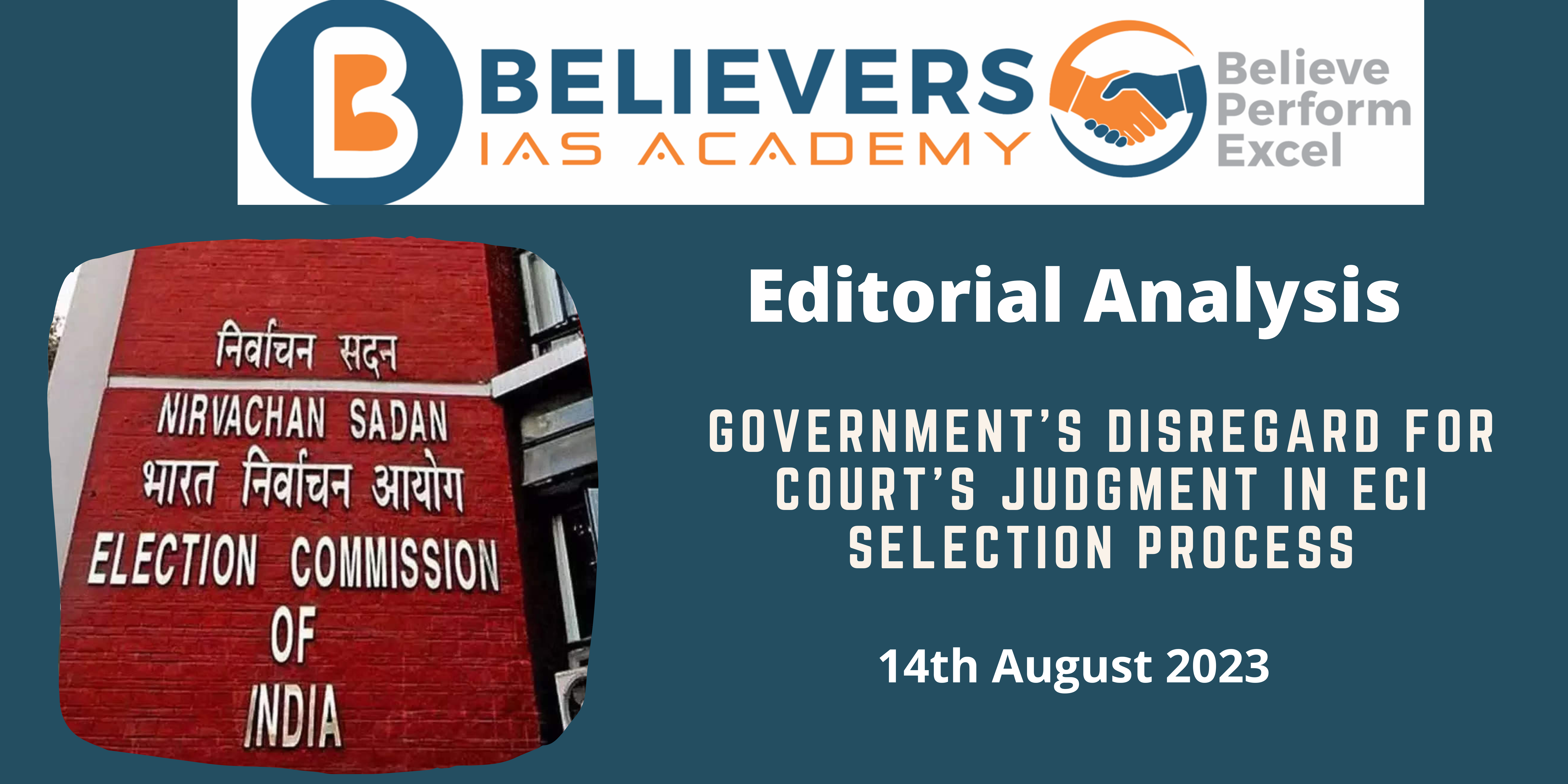Government’s Disregard for Court’s Judgment in ECI Selection Process
Context:
The recent proposal by the Union government to establish a three-member selection panel, tilted towards the executive, for appointing members of the Election Commission raises concerns about safeguarding the commission’s autonomy.
Relevance:
GS – 02 (Constitutional Bodies, Transparency & Accountability)
Prelims:
- Chief Election Commissioner (CEC) and Election Commissioners
- Supreme Court
- Public Interest Litigation
- Article 324
- Model Code of Conduct.
Mains Question:
Discuss the significance of an independent Election Commission in upholding the integrity of electoral democracy, analyzing recent developments and the need for a balanced selection process. (250 words)
Dimensions of the Article:
- Constitutional Contradictions
- Balancing Legitimacy and Scrutiny
- The Essentiality of Autonomy
- Global Observations
Constitutional Contradictions:
- The government’s proposition of a selection committee led by the Prime Minister, the Leader of the Opposition, and a Union Cabinet Minister starkly contradicts a recent judgment of a Constitution Bench.
- This judgment emphasized the inclusion of the Chief Justice of India in the selection committee, aligning with suggestions from the Dinesh Goswami Committee in 1990 and the Justice Tarkunde Committee in 1975.
- While the Court’s order was subject to legislative enactment, sidelining the Chief Justice’s role seems to undermine the spirit of these recommendations.
Balancing Legitimacy and Scrutiny:
- One perspective argues that involving the Chief Justice in the selection process could grant premature legitimacy to appointments, potentially hindering judicial assessment of selection errors.
- However, juxtaposed against the Election Commission’s dual role as an electoral overseer and a quasi-judicial entity, the need for a selection process that insulates it from executive dominance gains credence.
The Essentiality of Autonomy:
- A non-partisan and independent Election Commission stands as a foundational pillar of a vibrant electoral democracy.
- Over time, the Election Commission of India has played a pivotal role in facilitating elections that exhibit greater public participation due to their transparent, impartial, and accessible nature.
- Prior to the 2019 general elections, the announcement delay, coinciding with government inaugurations, cast a pall over impartiality. The uneven enforcement of the Model Code of Conduct, favoring the ruling party, prompted internal dissent.
Global Observations:
- The V-Dem Institute’s classification of India as an “electoral autocracy” underscores the issue’s gravity.
- This classification stems from the ECI’s diminishing autonomy. This erosion, noted by an international institution that evaluates democracies globally, paints a concerning picture.
Way forward:
- Constitutional Commitment: With the upcoming Lok Sabha elections drawing near, the government’s fidelity to the Constitution Bench’s directive should have been unwavering. The preservation of the Chief Justice’s involvement in the selection process aligns with the Constitution’s democratic ethos and the Election Commission’s crucial role in maintaining electoral integrity.
- Opposition’s Onus: It now falls on the Opposition to ensure thorough deliberation and modification of the proposed Bill. A robust parliamentary debate would shed light on the concerns surrounding the executive’s dominance in the selection process, reaffirming the Constitution Bench’s principles.
Conclusion:
The government’s recent proposal to establish an executive-skewed selection committee for appointing Election Commission members raises pertinent questions about the commission’s independence. A free and impartial Election Commission is indispensable for a robust democratic process, and global observations underscore its significance. Upholding the Constitutional commitment by retaining the Chief Justice’s role in the selection process and fostering parliamentary discourse on the matter would restore the equilibrium vital for sustaining India’s democratic fabric.




